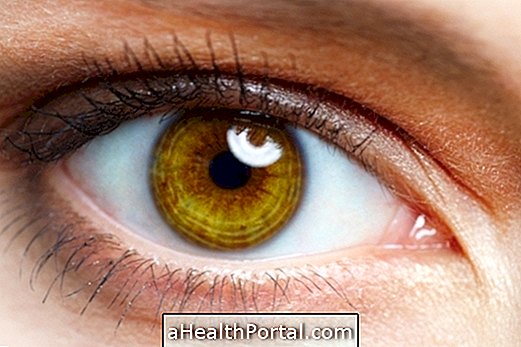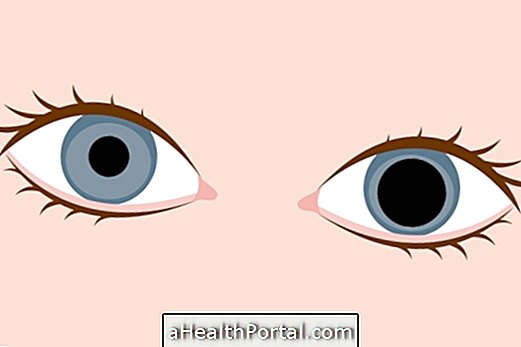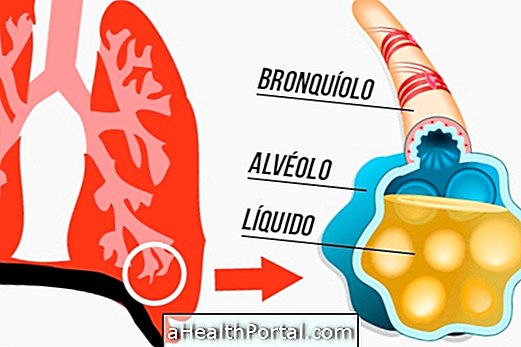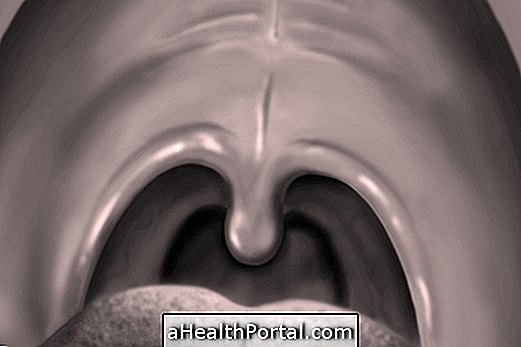Burning in the eyes may indicate allergy, exposure to smoke, conjunctivitis or eye problems such as myopia or astigmatism. Therefore, it is necessary to take into account other symptoms that are present as swollen eyes, tearing, itching or irritation in the eyes and when these symptoms have arisen to inform the doctor, which helps in the diagnosis.
Some of the common causes of burning eyes are:

1. Exposure to dust, wind, smoke or cigarette
A common cause of burning eyes is the fact that the person is exposed to dust, wind or contact with the smoke of a barbecue or cigarette, for example. These situations dry out the eyes, causing the sensation of burning and redness. This even helps clear the surface of any irritating agent that may be causing this discomfort.
- What to do: Dipping 2 to 3 drops of saline in each eye can be a good way to improve ocular dryness and fight the burning. Washing your face with cold water also helps a lot. See an excellent home remedy for burning eyes.
2. Dengue fever
In some cases, dengue can cause burning of the eyes, and the most common is the onset of pain, especially in the back of the eyes, and being dengue, other symptoms that must be present include pain in the whole body, fatigue and lack of energy. Check out all the symptoms of dengue.
- What to do: If it is dengue, it is recommended to drink plenty of water and rest as much as you can to recover faster.
3. Sinusitis
Sinusitis, which is inflammation of the sinuses, can also cause burning in the eyes and nose, as well as runny nose, headache, sneezing, and difficulty breathing.
- What to do: In this case it is important to be diagnosed by your doctor because in some cases you may need to take antibiotics to fight the infection. See the remedies that can be used against sinusitis.
4. Dry eye syndrome
The dry eye syndrome mainly affects people who need to work long hours in front of the computer, which decreases the frequency with which they blink which leaves the eye drier than it should.
- What to do: In addition to being aware that you need to blink more often you can use saline or some eye drops just to keep your eyes moist. Learn all about dry eye syndrome.
Another possibility is dry weather because when there is low humidity in the air, the eyes become more sensitive and there is the sensation of sand in the eyes and even difficulty reading at night. Using a lubricating eye drops may be used, but a medical evaluation is important to check if there is any disease that is leading to the manifestation of this symptom.

5. Allergic conjunctivitis
In allergic conjunctivitis the redness and pain in the eyes may be accompanied by other symptoms such as swelling and sand feeling in the eyes. It can be caused by pollen, animal hair or dust. It usually affects people susceptible to allergy as in cases of rhinitis or bronchitis.
- What to do: Putting cold compresses on the eyes can help reduce discomfort, another good tip is to wash your eyes regularly with saline solution to eliminate secretions. See the remedies indicated for conjunctivitis.
6. Myopia, Astigmatism, Presbyopia
Eye changes such as myopia, astigmatism, or presbyopia may also cause burning of the eyes, but other symptoms should also be present as changes in vision, such as blurred or blurred vision, difficulty reading small print from a newspaper, for example.
- What to do: It is advised to go to an appointment with an ophthalmologist to perform tests that can confirm changes in vision, and perform treatment that can be done with glasses or eye drops.
When to go to the doctor
Call your health care provider if you develop the following signs and symptoms:
- Intense eye itching;
- Burning in eyes, being difficult to keep eyes open;
- Difficulty in seeing;
- Blurred or blurred vision;
- Constant tearing;
- Lots of eye patch.
These situations may indicate that you need to use medications to control these symptoms, so you should go to the doctor's office as soon as possible.
























